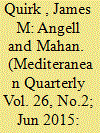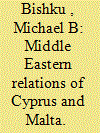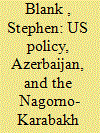|
|
|
Sort Order |
|
|
|
Items / Page
|
|
|
|
|
|
|
| Srl | Item |
| 1 |
ID:
139376


|
|
|
|
|
| Summary/Abstract |
Norman Angell and Alfred Thayer Mahan were two of the leading thinkers on pre–World War I “interdependence,” offering competing lessons on the changes in technology, economics, and security. At different times during the twentieth century, each one’s ideas seemed to best explain global politics and strategy. This essay reconsiders their ideas in the current era of globalization and global threats.
|
|
|
|
|
|
|
|
|
|
|
|
|
|
|
|
| 2 |
ID:
139375


|
|
|
|
|
| Summary/Abstract |
This essay presents the major factors that make up the framework in which Greek foreign policy operates and explores whether they have any connections to past centuries, especially to Antiquity. They include Greece’s consequential geographical location between East and West and the fact that the country has often found itself at the center of international developments and debates. It is argued that Greece’s relative weakness demands strong alliances, elicits compensatory actions, and often allows individual politicians to play an outsized role in diplomatic affairs. Finally, the salience of nationalism, the current return to a more active participation in the eastern Mediterranean, and the extraordinary resilience of the Hellenes complete an explanatory framework for Greek diplomacy with specific historic antecedents.
|
|
|
|
|
|
|
|
|
|
|
|
|
|
|
|
| 3 |
ID:
139374


|
|
|
|
|
| Summary/Abstract |
Cyprus and Malta are small Mediterranean states located on the periphery of Europe that have had unusual political affiliations following independence from Great Britain in 1960 and 1964, respectively. Historically and culturally they have had Middle Eastern connections. Cyprus was the scene of Arab settlement and later Ottoman rule, and today one-fifth of the population is Muslim Turkish, while the rest is predominantly Greek Orthodox. Malta was under direct Arab rule and its language is Semitic in origin, although its population today is almost exclusively Roman Catholic. Both countries used membership in the Non-Aligned Movement and later their connections with the European Union to gain leverage in foreign relations with more powerful states, especially in matters involving the Mediterranean region. During the Cold War and its aftermath, their ties with Middle Eastern neighbors have also brought economic benefits and a greater sense of security without their having to join military alliances.
|
|
|
|
|
|
|
|
|
|
|
|
|
|
|
|
| 4 |
ID:
139372


|
|
|
|
|
| Summary/Abstract |
Thousands of young Europeans have joined the jihad. This essay looks at the reasons why the holy war is so popular among this cohort. While failed integration policies and widespread online media recruitment remain crucial for understanding this popularity, these explanations alone are too simplistic. Personal knowledge of other young fighters and fundamentalist imams, a lack of guidance resulting from the absence of fathers, trauma, and a kind of “outsiderism” akin to the one seen among early Nazi recruits in the 1920s are also similarities found in many of the young volunteers’ biographies.
|
|
|
|
|
|
|
|
|
|
|
|
|
|
|
|
| 5 |
ID:
139378


|
|
|
|
|
| Summary/Abstract |
The Nazi German entry into the Balkans in the spring of 1941, together with the complete dismemberment of the Kingdom of Yugoslavia, heralded the birth of the Nezavisna Drzava Hrvatska (NDH) or “Independent” State of Croatia. Run by the Ustashe, the NDH was an ideologically fascist state that, during its brief existence between April 1941 and May 1945, subjected its minority Serbian population to genocide. In addition to many hundreds of thousands being killed or forcibly converted to Roman Catholicism (the religion of the Croats), many Serbs fled the territory of the NDH for neighboring Serbia. The bitter memory held by these Serb survivors of the Ustashe regime, in particular the refugees, constituted a subversive force throughout the period of the second Yugoslavia, culminating in the Yugoslav Wars between 1991 and 1995.
|
|
|
|
|
|
|
|
|
|
|
|
|
|
|
|
| 6 |
ID:
139377


|
|
|
|
|
| Summary/Abstract |
Even as the world focuses on Ukraine, Washington has conspicuously ignored resolute action to resolve existing conflicts in the Caucasus, in particular the so-called frozen conflict between Armenia and Azerbaijan over Nagorno-Karabakh. Here, Washington has refused to see that Russia is playing a malignant role in perpetuating the conflict and has refused to act on its own to help prevent either a new Russian domination of the Caucasus or a new war. Indeed, Washington sees Moscow as playing a constructive role. As a result, US relations with Azerbaijan and Baku’s willingness to take heed of American lectures on human rights have all suffered.
|
|
|
|
|
|
|
|
|
|
|
|
|
|
|
|
| 7 |
ID:
139373


|
|
|
|
|
| Summary/Abstract |
This essay studies the rise, decline, and rebirth of al Qaeda in Iraq (AQI) and its transformation into the Islamic State of Iraq and al-Sham (ISIS). It first examines AQI’s distinctive vision and its defiance of al Qaeda central. Abu Musab al-Zarqawi’s anti-Shiite jihadist perspective, dramatized by AQI’s use of social media, attracted thousands of foreign fighters to Iraq. The Jordanian’s struggle against Shiite apostates and 2006 martyrdom in a US airstrike continues to dazzle young militants. Second, the essay analyzes AQI’s regeneration and metamorphosis into ISIS and its challenge to al Qaeda’s central command. Abu Bakr al-Baghdadi’s refusal to recognize the authority of al Qaeda’s Ayman al Zawahiri and Baghdadi’s violent resistance to reconciliation measures has sparked destabilizing intrajihadist warfare. Third, the essay examines ISIS’s position as it resists attacks by Iraqi regime forces, rebel groups, Kurdish militants, and US-led coalition air strikes. The essay’s concluding observations analyze the parallels and differences between the Armed Islamic Group’s campaign in Algeria in the 1990s and ISIS’s position in Iraq and Syria in 2015.
|
|
|
|
|
|
|
|
|
|
|
|
|
|
|
|
|
|
|
|
|